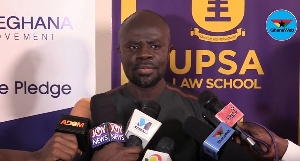 Dean of the Faculty of Law at UPSA, Dr Kofi Abotsi
Dean of the Faculty of Law at UPSA, Dr Kofi Abotsi
• Kofi Abotsi says government officials who played a role in the GPGC contract can be punished if found culpable of negligence
• A UK court awarded a judgment debt of $170 million against the government of Ghana for the termination of the contract
• Some appointees of both the Mahama and Akufo-Addo administrations have turned on each other in a spree of blame games
The Dean of the Faculty of Law at the University of Professional Studies, Accra (UPSA), Dr Ernest Kofi Abotsi, has stated that state officials who may be established to have acted negligently in the awarding and termination of the GPGC power contract could face legal consequences.
Following a UK court’s decision to award a judgment debt of $170 million against the government of Ghana for the termination of a power contract with Ghana Power Generation Company, elements of the previous John Dramani Mahama government and the current Nana Addo Dankwa Akufo-Addo government have turned on each other in a spree of blame games.
The Attorney General, Godfred Yeboah Dame, in recent media interactions have warned of legal consequences for members of the previous government in their roles leading to the awarding of the power generation contract.
On their part, members of the previous government including the former Deputy Power Minister, John Jinapor have asked for the blame to be placed on the current government which terminated the contract when it took over power.
Reacting to this development on Joy News file monitored by GhanaWeb, Mr Kofi Abotsi said persons who were involved in the awarding and termination of the contract could be put up to face legal consequences should it be established that they acted negligently in the execution of their duties.
According to Mr Abotsi all state officials including the Attorney could be made to face legal consequences if it ever happens that they failed in being diligent and were negligent in their roles.
“I do not subscribe to that view that the Attorney General has no liability on the basis of the performance of his duty, I don’t see that immunity in the constitution.”
“A lawyer can give the best of advice which can go wrong. That doesn’t make the lawyer liable. The liability of lawyers, and don’t forget that the Attorney General is a lawyer. The attorney General actually in the scheme of things we consider him the leader of the Bar. So he is the number one lawyer in Ghana. The liability of lawyers for advice often rests on negligence. It is a question of skill and diligence. So if a lawyer has exercised all skill and diligence, if the Attorney General has reviewed all the documents he is supposed to review, he has listened to all the law he is supposed to listen to, he has done all the consultations, he has reviewed all the cases among others, and he’s done all that a reasonable lawyer, a reasonable Attorney General should do and the advice still turns out wrong, the Attorney general is not liable. He is only liable if he fails to exercise skill and diligence.
“And therefore if he acts in a manner that is found below par as far as a good lawyer let alone an Attorney General should have behaved in that particular circumstance, then of course it’s a case of liability. So yes, the Attorney General is liable just like anybody else if we consider the question of causing financial loss to the state,” he stated.
Mr Abotsi clarified that despite the Attorney General’s Office having an extra liability based on the legal it provided in the awarding and the termination of the contract, other government functionaries also had the responsibility to exercise skill and diligence in their duties and therefore will be liable if they are proven to have failed in doing same.
“For the Attorney General, we are talking specific issues of legal liability or professional liability and negligence. But for other ministers and advisers and other government functionaries, they have a responsibility to also exercise skill and diligence in terms of their functions as state officials and that will be assessed when it comes to the question of causing financial loss to the state. Because causing financial loss to the state is based mainly on the question of willfulness and in considering whether your actions have been willful and therefore wrongful in that respect, the consideration is your exercise of discretion, your exercise of diligence and how careful you are in terms of management of all government business,” he added.
The Ministry of Power, which was created under the erstwhile National Democratic Congress (NDC), signed an Emergency Power Agreement with GPGC Limited for the procurement of 107MW power plant.
The agreement was signed on June 3, 2015, and was expected to be executed within a period of one month ending August 3, 2015.
The plant was to operate for a period of four years if it was procured. Unfortunately, GPGC could not meet the timeline and the ruling NDC lost power in 2016. The New Patriotic Party upon its assumption of power in 2017, reconstituted a committee formed under the previous NDC government to examine various power purchase agreements.
The NDC in its defense on the GPGC judgment debt has argued that the committee it set recommended a negotiated abrogation of the contract instead of an outright cancellation done by the current government.
According to the NDC, its line of action was estimated to cost the state only $18 million in payment of compensation to GPGC instead of the $170 million judgment debt